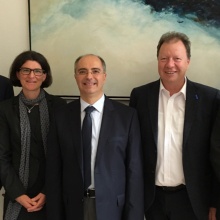Prof. Tankut Yalcinöz from Turkey has been a guest researcher at the Institute of Energy Transmission and High Voltage Technology (IHE) for one year. He conducts research in the field of renewable energies, planning and development of power systems, smart grids and especially fuel cells. Host professors are Prof. Stefan Tenbohlen and Prof. Krzysztof Rudion from the IHE. Yalcinöz receives a scholarship under the Philipp Schwartz Initiative. This fellowship is awarded for a period of two years to researchers at risk. Prior to this, Tankut Yalcinöz had been doing research at the University in the Turkish city of Konya in Central Anatolia for several years, completed his Ph.D. in Great Britain and worked as a research fellow in the USA. He is married and has four children: "I led a completely "normal" life as a scientist."
Fear of dismissals and arrests
Then, as is well known, much changed in Turkey. Yalcinöz reports that the situation has become very difficult for many researchers in Turkey since 2014. Especially after the coup attempt in the summer of 2016, more than 10,000 scientists were severely hindered in their work, suspended, dismissed or even arrested. Academic mobility and freedom of travel have also been restricted. Some researchers have to register weekly and are not allowed to leave their homes. The fear of dismissals and arrests is great. Academic life is hardly possible; the livelihood of many is threatened or already deprived. The Turkish researcher describes how people's interaction with each other is also changing. Within families or among friends and neighbours, one could suddenly no longer talk about everything out of concern that some information might reach the wrong people.
Scholarship secures the existence
When the 50-year-old left for one of the few permitted visits, a conference in the USA, these circumstances let him stay there, i.e. not to fly back home. Instead, he came to Germany at the end of 2016. In March he contacted Prof. Stefan Tenbohlen and Prof. Krzysztof Rudion from IEH and in April the University of Stuttgart applied for the Philipp Schwartz Scholarship on his behalf. In September 2017 he started as a guest researcher. His family has also lived in Stuttgart for about a year, initially for a few months in the Gastdozentenhaus. In the meantime, he found a flat with the support of the staff of the Department of International Affairs. He has been learning German for over eight months. "My children can speak more fluently than me, though," he admits with a smile.
Diverse help for the researcher and his family
He left his home, friends and family, his house and his work behind. Tankut Yalcinöz is now very happy to have access to the scientific community again and to be able to conduct research: “This would not have been possible without the help of the University of Stuttgart.” His research focuses on using particle swarm theory as a tool to optimize distribution problems in the energy market in order to save energy and reduce costs and emissions. In June, he presented his results of a fuel cell system for operating a light electric at a conference in Italy and presented his results about vehicle there.
The scientist from Turkey thanks Stefan Tenbohlen and Krzysztof Rudion from the IHE and his colleagues from the Institute for their friendship and help. He is also very grateful to the Welcome Center team: "They have always been very friendly and helpful in finding an apartment and solving a variety of problems.”
What are his plans for the future? He has been a professor in Turkey. Now he is also aiming for professorship in Germany or abroad. He could also be employed at a research institute or in industry. But in the long run, his great desire is to be able to return to Turkey.
The Philipp Schwartz Initiative was initiated by the Alexander von Humboldt Foundation in cooperation with the Federal Foreign Office and enables universities, universities of applied sciences and non-university research institutions in Germany to award fellowships for research stays to researchers at risk. This initiative is financed by the Federal Foreign Office, the Alfried Krupp von Bohlen und Halbach Foundation, the Andrew W. Mellon Foundation, the Fritz Thyssen Foundation, the Gerda Henkel Foundation, the Klaus Tschira Foundation, the Robert Bosch Foundation, the Stifterverband and the Mercator Foundation.



